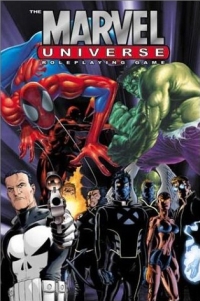Marvel Universe Roleplaying Game
 |
|
| Designer(s) | Dan Gelber, Jeffrey Simons, Evan Jones, Bill Jemas, Mark D. Beazley |
|---|---|
| Publisher(s) | Marvel Comics |
| Publication date | 2003 |
| Genre(s) | Superhero fiction |
| System(s) | Custom |
The Marvel Universe Roleplaying Game (abbreviated MURPG) is a role-playing game (RPG) set in the Marvel Universe. It was published in 2003 by Marvel Comics. The game used a diceless system different from either of the previous RPGs set in the Marvel Universe.
The game included versions of several popular Marvel characters, including Spider-Man, Hulk, Captain America, the Fantastic Four, and the X-Men. It also allowed for designing one's own heroes and villains.
The SAGA-based Marvel Super Heroes Adventure Game (1998) lasted into 2000, and after that, TSR's long history with Marvel came to an end. The next Marvel RPG would be The Marvel Universe Roleplaying Game (2003), published by Marvel itself, which was even more short-lived than TSR's previous game. The game featured tactical resource management, something originally made popular in the indie RPG movement.
The central game mechanic is the allocation of energy/effort, in the form of "red stones". These stones, initially equal in number to the character's "Energy Reserve" statistic are allocated to powers, attacks, and defenses by the players and GM. Allocated stones are then compared to determine success or failure at tasks.
Opposed tasks are handled by comparing how many red stones each character has allocated to the struggle, with the character who has put in more winning. The degree of success is determined by how many more stones the winner put in.
Normal tasks have both a Difficulty Level and a Resistance. The Difficulty Level determines the minimum value one must have in a relevant trait to have any chance of success at all. If the character's trait meets or exceeds the Difficulty Level, then the player may allocate red stones of effort to the task; the number needed to succeed is the Resistance. For some tasks, the Resistance must be overcome in a single action; for others, it may be overcome in a series of actions. The latter type usually applies where a task can be accomplished over some time—e.g., safecracking, solving a puzzle, or other such tasks.
...
Wikipedia
